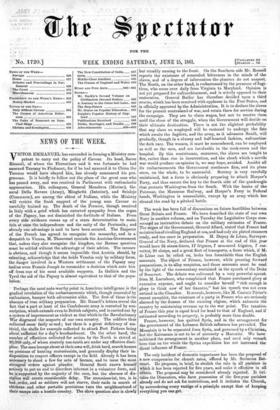' Perhaps the most'
ost note-worthy point in American intelligence is the gradual revelation of the embarrassments which, though concealed by enthusiasm, hamper both adversaries alike. The first of these is the absence of true military preparation. Mr. Russell's letters reveal the fact that a part at least of the Confederate army is recruited by con- scription, which extends even to British subjects, and is carried out by a system of impressment as violent as that which in the Revolutionary War disgraced the seaports of our own country. The soldiers thus collected seem fairly armed ; but there is a great deficiency of ma- teriel, the shells for example collected to attack Fort Pickens being about sufficient for a day's bombardment. On the other hand, the number of effectives collected for action by the North is stated at 90,01)0 only, of whom scarcely one-tenth are under any effective disci- pline. The men lounge about at their own will, drink hard, search houses on pretence of hunting secessionists, and generally display their in- disposition to respect officers except in the field. Already it has been necessary to shoot a few for acts of licence, and to issue the most stringent orders against plunder. General Scott exerts himself actively to put an end to disorders inherent in a volunteer force, and he is supported by the majority of the men, but the absence of dis- cipline will create considerable delay. The commissariat, too, is in bad order, and as soldiers will not starve, their raids in search of chickens and other portable provisions turn the neighbourhood of their camps into a hostile country. The slave question also is slowly but steadily coming to the front. On the Southern side Mr. Russell reports the existence of concealed bitterness in the minds of the slaves, and of a degree of information the planters do not suspect. The North, on the other hand, is embarrassed by the presence of fugi- tives, who come over daily from Virginia to Maryland. Opinion is not yet prepared for enfranchisement, and is utterly opposed to their restoration. General Butler has therefore decided upon a third course, which has been received with applause in the Free States, and is officially approved by the Administration. It is to declare the slaves for the present contraband of war, and retain them for service during the campaign. They are to claim wages, but not to receive them until the close of the struggle, when the Government will decide on their ultimate destination. There is not the slightest probability that any slave so employed will be restored to undergo the fate which awaits the fugitive, and the army, as it advances South, will gradually, though in a clumsy and half-hearted fashion, enfranchise the dark race. The women, it must be remembered, can be employed as well as the men, and are invaluable in the cook-room and the hospital. By this contrivance, moreover, the slaves are taught to flee, rather than rise in insurrection, and the shock which a servile war would produce on opinion is, we may hope,. avoided. Amidst all its embarrassments the Government continues firm, and its plans seem, on the whole, to be successful. Secrecy is very carefully maintained, but a force is obviously preparing to attack Harper's Ferry, and thus secure the key to the fourth side of the quadrangle that protects Washington from the South. With the banks of the Potomac, the Manassas Railway, and Harper's Ferry in Federal hands, Washington is unassailable, except by an army which has cleared the road by a pitched battle.






























